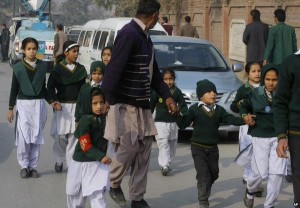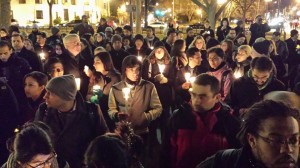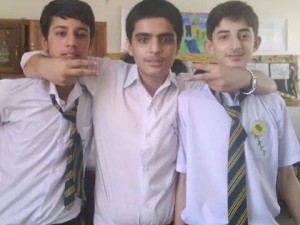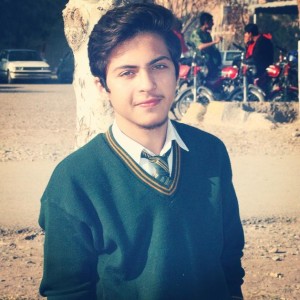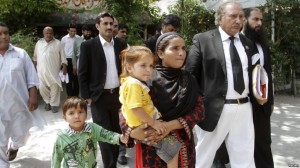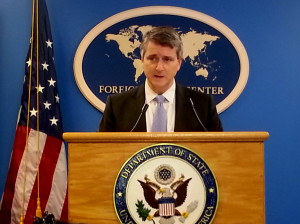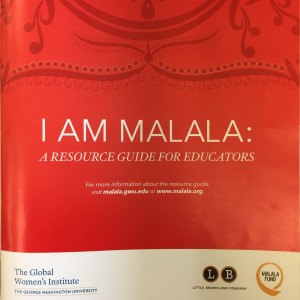
By Iftikhar Hussain
‘I am Malala’, the inspirational memoir of the Pakistan teenager Nobel Laureate and global icon for education, Malala Yusafzai, made more impact into the lives of young people from across the world when on Wednesday parts of her book were included in the George Washington University curriculum.
“The resource guide is targeted towards high school, college and university students in the United States and overseas,” said the University website on Wednesday following its decision to include it in its curriculum.
Malala, a student herself, will inspire students from across the globe in one of the world leading educations institutions George Washington University classrooms.
The website explains that a resource guide designed as a series of lessons based on themes extracted from the memoir, I Am Malala, is intended to enrich a variety of academic programs.
The university says that the resource guide provides a window into complex issues of politics, history, human rights, religion and tradition through the lens of one girl’s story.
Malala was shot in the head by Mullah Fazlullah-led terrorist outfit Tehreek-Taliban in 2012 for raising her voice for women education in here native Swat valley. She survived and became a global icon for women education. She was awarded the Nobel Peace Prize in December 2014 along with the Indian Child rights activist Kelash Satyarthi.
The decision by GWU was welcomed by educationists and women rights activists in Malala’s terror hit region, calling for replication of the idea in Pakistan.
Khadim Hussain, a leading expert on education and militancy in the region, in an interview with Deewa welcomed the George Washington University and said, “It’s an eye-opener for educationists in Pakistan.” He argues that the need is greater than ever to promote women education in the Pashtun region hit by militancy and extremism. “All the developing nations especially Pakistan and the Pashtun region can benefit from the George Washington University decision. It provides a framework for all those involved in education offering an opportunity to adopt it.”
Mussarat Qadeem, who runs an organization Payman Trust for women education and peace in the terror-hit tribal region, told Deewa in an intv praised the George Washington University decision. She said, “It’s a good thing. I have always raised voice for an inclusive education syllabus in Pakistan, the curriculum which promotes interfaith harmony and co-existence with other religions. The reason is that education in Pakistan gives one side of the picture even on the standards of religion.”
She said that it is unfortunate Pakistani society has double standard when it comes to women rights and especially education. She said, “The people bring Islam in everything, but when it comes to the rights of women, everything is clear but then even religion is not followed.”
Experts say the decision by GWU to include Malala’s book in its study program would help promote her cause of women education and will also draw global attention to the status of education in the Pashtun region of Pakistan.
‘I Am Malala’ Becomes Part of GWU Curriculum
Paris Shooting Confronts Pakistani Cartoonists With More Threats
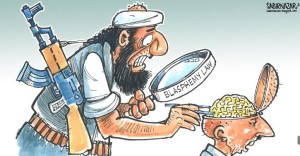
By Iftikhar Hussain
Pakistan’s leading cartoonist Sabir Nazar says that they are already under attack from the extremists, Pakistan cartoonists now face a bigger threat after the Paris shooting. He fears that rings an alarm bell for cartoonists around the world and especially those in Pakistan, where blasphemy carries the death sentence. “The biggest problem is that now cartoonist will be targeted as community because of the blasphemy image perceived by the extremist,” he said.
In an exclusive interview with VOA Deewa after Paris shooting, Nazar shared his career long experiences working for Pakistani media what he dubbed as increasingly overtaken by religious and conservative thought.
Nazar, who currently works for Express Tribune news publishing company, has worked for Pakistan’s leading newspapers and is known for his incisive satire on the country’s political and social issues.
He says that in the face of growing extremism, the cultural space is squeezing in Pakistani media and it has restricted the pen of a cartoonist. Nazar predicts that Paris shooting is a precursor to more attacks in future on visual arts in Pakistan. “The extremists are afraid of visuals more than words and that means more trouble for music, theater, film and all visual arts in future.”
He raised questions on the Pakistani media pro-right wingers discourse. He says, “Pakistani mainstream Urdu media ran a headline on Paris shooting saying, Sahtim Rasool wasil Jahannam Hogiya –a blasphemer sent to hell”.
He told VOA Deewa that extremism has changed the satire climate in Pakistan. “I make 40 cartoons instead of 30 because mostly my cartons are censored.”
Uneasy with a censored media environment in Pakistan for years, he was frank to say, “This self-censorship has pushed me to a very strict playfield.” I am clearly told not to make cartoons on Pak Islamist parties, Pakistan army and blasphemy laws.”
You cannot select political parties for satire and have to be objective. “If I am not allowed to make cartoons of PTI, JI and the army, why I should satire the other parties and I have principally decided not mock PMLN and PPP.”
“Given the shrinking space for free expression and thus my work, in Pakistani media I often think to burn my cartoons.”
He says Pakistani media serves as fronts for different industrialists and safeguards their interests and the real media is social media. For an example, he says that the Hangu school boy Aitzaz Hassan story, who confronted a suicide bomber to save his school, was not carried for days by the mainstream media and after his picture was shared on twitter, he got attention from the other media. And so is the case of Malala, she was not given due attention until the social media campaign and later the Nobel Peace Prize made her way to the Pakistan media.
And finally he doubts the official rhetoric in Pakistan that the military is targeting extremist in North Waziristan in the ongoing operation, and says, “Are the rational and liberal voices in Pakistan safe? The answer is no, how can I believe that Pakistan is targeting extremists.”
Militants have also this image of taking offense to satire and criticism. They are known to frown on laughter at their expense and they would respond with violence.
Pakistan announces Military Courts amid Skepticism
Prompted by the massacre of school children in Peshawar, Pakistan seems to have succeeded in mustering the crucial support of the political and military leadership to come on the same page to take effective steps to eliminate the menace of terrorism.
“We will establish the military courts for trying the terrorists,” the prime minister Nawaz Sharif announced in a speech to the nation after the day-long deliberations with members of parliament, political and military leaders. There is a mixed reaction to the formation of military courts. The legal community in Pakistan have spoken pro and against the military-led speedy justice. Fahim Wali, a legal expert says military court in the past has worked as investigator, prosecutor and executor of the justice. Some civil society groups and leading lawyer Tareq Mehmood see the step as violation of the constitution.
Pakistanis were impatiently waiting for the outcome of the week-long deliberations of the special committee constituted by the government in consultations with parties having representation in the country’s parliament. Prime Minister Nawaz Sharif in his speech expressed his government resolve in no uncertain words saying there would be no place for terrorist outfits throughout the country including Punjab.
“The pain inflicted by the terrorists will not go unpunished,” said the premier in his televised speech Wednesday night.
The December 16 attack on the Army Public School in Peshawar left 134 students and nine staff members of the school dead and scores of others injured when terrorists from banned Tehrik-e-Taliban Pakistan (TTP) stormed the school. Three watchmen and a soldier were also killed in the attack. Pakistan military spokesman General Asim Saleem Bajwa in a tweet said that all the seven attackers were eliminated.
Details of the recommendations were revealed to media by Prime Minister, Nawaz Sharif which beside other measures, entrusted Pakistan armed forces to play central role both in the offensive at the ground against militants as well as establishing summary military courts to deal with the terrorists.
The Prime Minister announced that necessary amendments will be made in the constitution to create room for the establishment of Special Trial Courts to be headed by military officers. Pakistani civil courts could not manage to deal with the terrorists as majority of the accused were either freed by courts due to lack of evidences or their cases could not be brought before the courts for years. Nawaz Sharif said the Special Trial Courts would be functional for two years.
The anti-terrorism policy, political analysts believe has been brought for the first time since the taking over of power by Nawaz Sharif in June 2013. Sharif praised the political leadership and Chief of the armed forces, Gen. Raheel Sharif for their resolve to fight terrorism in all forms.
“No private armed groups, their hideouts, financing and hate literature will be tolerated,” Mr. Sharif said adding that the days of terrorists have been numbered in the new Pakistan. “We will revenge the blood of the children and it will be very soon,” he said. The prime minister didn’t name the banned militant outfits unleashing terror and hate with different names and faces. The government’s determination will be tested in Punjab and Pakhtunkhwa provinces as well as in the tribal belt known as FATA. Punjab is the stronghold of US and India wanted militant leader Hafiz Saeed, Pakhtunkhwa and FATA is considered hub of terrorism with strongholds of the lethal Haqqani network, TTP and several foreign and local terrorist groups.
To find political solution to the issue of volatile Balochistan province, where Baloch nationalists fight for their independence from Pakistan, the premier said full powers are being delegated to the provincial government to seek a negotiated and viable solution to the conflict. Pakistan is in the grip of militancy and sectarian violence sense decades which took tens of thousands of lives and forced millions of people, especially Pashtuns and Baloch to become Internally displaced people (IDPs). Nawaz Sharif also said that steps are being taken to send the IDPs back to their homes and areas in FATA.
Washington D.C. Stands with Peshawar
by Niala Mohammad
“Why innocent children? What kinds of monsters target children?” Crowds of people gathered in DuPont circle with tearful disbelief at the events that unfolded in Peshawar. Hundreds gathered in Washington, DC’s DuPont Circle to light candles for the 141 lives lost in Peshawar, 132 of which were children.
Tehreek-e-Taliban Pakistan (TTP) spokesman, Muhammad Khorasani immediately claimed responsibility for the gruesome attack and stated, “the attack was in retaliation to the military operations in North Waziristan and Khyber tribal agency. We selected the army’s school for the attack because the government is targeting our families and females…we want them to feel the same pain.” He further boasted, “Six of our fighters successfully entered the army school and we were giving them instructions from outside.”
More than 1,000 students, from preschool to high school, were on the campus when the attack began. The six Taliban terrorist who stormed the Army Public School in Peshawar on Wardak Road entered classrooms and auditoriums opening fire on students and teachers, then walked around methodically shooting those that were still alive in the head and chest.
Surviving students tell their daunting stories that will likely haunt them for the remainder of their lives. One such survivor, Bilal Fayaz, told VOA Deewa Radio that his teacher and class were trying to exit the school building when Bialal’s friend Awais innocently ran ahead of his class anxious to escape. Bilal Fayaz said, “our madam and I told Awais not to run….but he didn’t listen. The Taliban saw him running and shot him head on.”
Another 8th grade student named Bilal Ahmed Khalil told VOA Deewa Radio, “I was stuck in the classroom. My friends and teacher were shot and killed in front of me. I played dead as the Taliban walked over me and the dead bodies of my friends on the classroom floor.” Bilal lost his two best friends Fahad and Tayyab in the attack.
Parents and family members of the schoolchildren shared similar horrific stories. Sajjad Khan told Deewa Radio that he received a phone call from his brother-in-law, who received a frantic alert from one of the school teachers caught inside the building with his classroom.The teacher was begging for help to save his classroom kids. Sajjad and his brother-in-law Saifullah Khan quickly reached the school but the Pakistani Army had surrounded the compound and asked the parents to stand back. Sajjad pleaded, “My kids are inside, how can I just stand here?”
Parents anxiously stood for hours outside of the Army Public School awaiting the fate of their children. Some were overjoyed with relief to see their sons and daughters amidst the crowds of children being scurried out, while other less fortunate parents awaited their child’s fate, frightened and inconsolable. Eighteen year old Mubeen Shah Afridi, a popular student at APS returned home to his mother in a coffin. Mrs Shah holds Mubeen’s clothes to her chest and wails uncontrollably, she keeps repeating, “he went to school without eating breakfast.”
Bollywood actor Anupam Kher stated it best, “Your dastardly act today will have united parents everywhere and earned you their curses.” Parents and children around the world have stood by Peshawar during this time of mourning, offering support and encouragement to break their long kept silence against the Taliban’s atrocities. The nation’s capital-Washington D.C. is familiar with the pain of seeing their children suffer as there have been an estimated 96 school shootings in America over the past two years. Perhaps this is why so many stood in solidarity with Peshawar on Tuesday evening.
Contributions and Photo-Credits:
Sara Sultan Kiani, Bilal Ahmed Khan, Hashim Ali and Arshad Mohmand
Malala Message: “Our voices have grown louder and louder.”
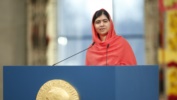
By Iftikhar Hussain
Malala Peace Nobel message is loud and clear, “We survived, our voices have grown louder and louder.”
A win for the mainstream Pashtun narrative: Malala speaks form her heart and her voice always have a greater appeal globally. Malala message at the Nobel Peace Award Ceremony in Oslo was clear and resolute when she said; “the terrorists tried to stop us and attacked me and my friends on October 09, 2012, but their bullets could not win”.
Malala, a symbol of world hope: Malala Yusafzai offered hope Wednesday that her prize will inspire young girls all over the world to fight for their rights and to step forward to lead. She said “I feel that it’s not just me receiving the award,” Malala said. “It’s all these girls, this young generation, they have been working so hard, and it’s their voice that I would be raising in my speech today.”
Thinking locally, acting globally: As the first-ever Pashtun to have received Nobel Peace Award, she was laser focused on the top issue of girls education in the region amid the threats posed by armed extremists and yet she made it with a global appeal. She called on the world community, “We ask the world leaders to unite and make education their top priority.”
Malala working for a Global Cause: Though she comes from a small town of Swat in northern Pakistan, she is working for a global cause and at Oslo the world listened to her. She told the gathering, “I am not alone. It is the voice of those 66 million girls. Education went from being a right to being a crime; we had a thirst for education. So it becomes the last time that we see a child deprived of education.” Let this be the last time that a girl is told education is a crime and not a right.” It is for those voiceless children, who want change”.
Youngest ever recipient of the Nobel Peace Prize: Malala Yusafzai, being a youngest ever recipient of the award shared her feelings adding a little bit humor to it. She said, “Though I appear as one girl, one person, who is 5 foot 2 inches tall, if you include my high heels. I am not a lone voice, I am many. As far as I know, I am just a committed and stubborn person who wants to see every child getting quality education, I am pretty certain that I am also the first recipient of the Nobel Peace Prize who still fights with her younger brothers Malala Yusafzai, This award is not just for me. It is for those forgotten children who want education.”
Looking for common grounds, different faiths, one voice: Malala’s speech was a true reflection of the fact that the people of different faiths in the world face same issues and need common efforts to be resolved. She joined her co-recipient Kailash Satyarthi sharing her cause of children rights. She said, “I am not alone. I am sharing my award with Kailash Satyarthi; work for human rights. Kailash is from Indian and I am from Pakistan, He believes on Hinduism and I believe on Islam. This lesson to the world. She says, as my father gives me something extra but never clips my wings, I am very thankful to my father that they do not clip my wings”.
Thorbjoern Jagland, Chairman of the Norwegian Nobel committee, said at the ceremony in Oslo, “A young girl and a somewhat older man, one from Pakistan and one from India, one Muslim, the other Hindu; both symbols of what the world needs: more unity. Fraternity between the nations!”
Malala’s global bond: The Salt Lake Tribune writes that Malala has felt the bond of a global sisterhood of sorts, with women gathering the strength to fight for education, the key to a future. To drive home the point that women must have greater inclusion in the next generation of leaders, she brought five girls to the festivities from Nigeria, Syria and Pakistan to share their hopes and dreams of a better life.
The newly minted laureate has herself often expressed her wish to lead — setting sights on one day becoming Pakistani prime minister and following in the steps of the late Benazir Bhutto.
Violence against Women; Pakistani women strugles with their own odds
Iftikhar Hussain
As the world marked the International Day for the Elimination of Violence Against Women, three women workers on an anti-polio campaign were gunned down in the southwestern city of Quetta, in what appears to be another challenge in Pakistan’s growing list of women’s rights issues. Pakistani women are already up against high odds: honor killings, acid attacks, domestic violence and a lack of implementation of laws regarding the women rights, are just some of the issues.
Among incidents of violence against women, attacks with acid are gruesome. They leave women with disfigure bodies, scars and life-long emotional and psychological trauma.And acid violence against women has increased in recent months. Aurat Foundation, an organization campaigning for women rights in Pakistan, says in a recent report that police have reported 59 cases of attacks with acid between January and the middle of October this year. Most of the cases were from Punjab, the country’s most populous province.
Acid attacks are common in Pakistan: Scores of such assaults take place each year. The Aurat Foundation report indicates a 12 percent decrease in acid-throwing incidents in Pakistan in 2012 as compared to 2011. The group’s reports, released each year, show that a total of 7516 cases were reported in 2012 as compared to the 8539 cases reported in 2011. Some 8000 acid-throwing cases were reported in 2010, 8548 cases in 2009 and 7571 in 2008, respectively.
Reasons behind the acid attacks: Acid is used as a means of violence for a variety of reasons, says Malik Asim, of the Aurat Foundation. In some instances a man whose love has been spurned attacks a woman with acid and in other instances acid has been used as a weapon in domestic disputes, in cousin rivalries or in disputes over property, Asim says.
Lack of Implementation of Laws On Women’s Rights: A former judge and human rights activist in Pakistan’s north western province of Khyber Pakhtunkhwa, Sher Muhammad Khan, told VOA Deewa, Pakistani society is a feudal one, women are considered personal properties and they are treated like “sheep and goats.” When law enforcement agencies fail to implement laws, the result is a rise in crimes against women, he says.
Role of clerics in improving women status: Miraj Humayoun, a female lawmaker in Khyber Pakhtunkhwa provincial assembly laments lack of political will on part of the country’s legislators to protect women rights. Talking to VAO Deewa, She called on religious clerics to end anti-women rhetoric. “Mullahs should talk on women rights in every Friday sermons”, she suggested.
Religious perspective on acid throwing against women: A religious scholar Dr. Zahid Shah told VOA Deewa Islam out rightly rejects such crimes against women. He said, “Unlike the anti-women practices in Pakistan, Islam protects women rights and calls for a rebellion against a state which fails to protect its womenfolk.”
Not only the issues they face to be resolved, half of Pakistan’s 180 million population feels marginalized in every field of life. In Pakistan patriarchal society, men usually head the family and thus assume the role of a decision maker for the family, leaving women with virtually no public voice. Though concerns for women independence runs high in public debates, but despite that fewer Pakistani men of the conservative Islamic society are seen part of the campaign for women rights.
Irrespective of when women rights laws get implemented or general social attitude toward women change, Asim Malik says that the scars of violence remain long lasting. “Every victim has her own story of shattered dreams and dashed hopes,” he said.
He says violence against women resonates strongly and spread fear.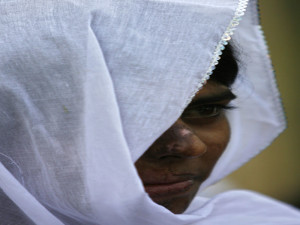
Four Sentenced to Death in Pakistan in ‘Honor Killing’
Iftikhar Hussain, Sadia Qasim Shah, Riaz Hussain
A Pakistani court sentenced four men to death Wednesday for the murder of a female relative in what the murderers considered an “honor killing.”
The crime was well-documented: The victim, Farzana Iqbal, was beaten to death outside a courthouse where she tried to seek protection from her relatives, who were angered that she had married a man against their wishes.
Her husband tried in vain to get nearby police to intervene.
The revelation that Iqbal’s husband had killed his first wife to marry her only added to the case’s notoriety.
But what has made Iqbal’s case truly remarkable is the sentence, said human rights activists, who noted that the murders of hundreds of women go unpunished every year in Pakistan.
According to the Human Rights Commission of Pakistan, the country’s largest independently run rights group, more than 900 women were killed for honor in 2011. The Aurat Foundation, a women’s rights group, said more than 3,000 people have been killed for “honor” in Pakistan since 2008.
VOA’s Deewa has been following the 2011 case of Shazia, a woman stoned to death in a village near Mardan, in northwestern Khyber Pakhtunkhwa province, and finds it to be far more typical.
Shazia had been married against her will in 2010 and had refused to live with her husband. She was still living with her parents a year later when one of her husband’s brothers persuaded her to visit her husband’s home in a nearby village.
It was a trap. Not far from Shazia’s parents’ home, 13 men were waiting for her. The brother-in-law and the men attacked, pelting her with stones until she was dead.
The brother-in-law justified the action, believing Shazia had “breached the family’s honor” by refusing to live with her husband.
Killings ‘forgiven’
Under family, tribal and clan traditions prevalent in Pakistan and other Muslim countries, a woman is blamed for “compromising family honor” if she marries for love, is suspected of having sex outside marriage, or otherwise breaks with tradition. A women thus condemned faces death, often at the hands of family members, who can then, under those same traditions, be “forgiven” by another relative for the crime.
There has been no forgiveness by Shazia’s family. Her father, Zareen Taj, a farmer in his 60s, sought justice in the crowded High Court in Peshawar. That’s where lawyer Khyal Muhammad Momand saw him in the halls.
“He looked tired and frustrated, with his eyes full of tears,” Momand recalled of their first meeting two years ago. Momand took the case pro bono. There were successes and setbacks.
They managed to bring the case to trial last year. But four suspects, including Shazia’s husband, were acquitted for lack of evidence.
The court has also issued an arrest warrant for the main suspect, the brother-in-law, but police have yet to carry it out.
Pakistan criminalized honor killings in 2004, yet as the Aurat Foundation noted, the law is largely ignored and unknown, even by police, outside major cities.
Aurat’s Saima Munir told Deewa that “our research in Nowshera [a district in Khyber Pakhtunkhwa] found that despite several honor killings in the past five years, not a single case was registered” under the 2004 law.
Rise in murders feared
In a recent report, the Aurat Foundation blamed honor killings not only on individuals who believe in male supremacy and their right to treat women as property, but on societal norms that pressure families to punish a female relative seen to be breaking with feudal traditions. Researchers are concerned that as women continue to exercise their basic rights, the instances of such murders may increase.
Even in death, the women continue to suffer. Munir said any woman killed in the name of honor is automatically stigmatized in the male-dominated society, and people tend to have placed their sympathies with the murderers.
“Even judges of the courts sympathize with the killers,” she said.
Some, but not all. Former judge and legal expert Liaquat Ali told Deewa that “the killers evade the law, because in most of the honor killings, the people involved are family members and they often come to a compromise.” Such was the case in the killing of the first wife of Farzana Iqbal’s husband, who was “forgiven” by the first wife’s son.
The first steps, the Aurat Foundation said, include increased awareness among police and legal authorities that the law backs them up on arresting and prosecuting such killers. The group also recommended using the community to shun the killers, rather than praising them, which would involve a massive campaign promoting human rights. Finally, it called on the media to address the matter head on, as a large number of honor killings simply go unreported.
Media attention appears to have played a role in the case of Farzana Iqbal, though it is just that “sensationalism” the defendants’ lawyers say they will use in an appeal.
Shazia’s death, like so many others, has remained in the shadows. Or as lawyer Momand said, Shazia’s story, like those of other victims, is one “of justice denied.”
Deewa’s Iftikhar Hussain reported from Washington; Deewa’s Sadia Qasim Shah and Riaz Hussain contributed from Pakistan.
This story was first published by VOA English News web site on November 19, 2014 3:14 PM
General Sharif’s US Visit-Bitter and Sweet
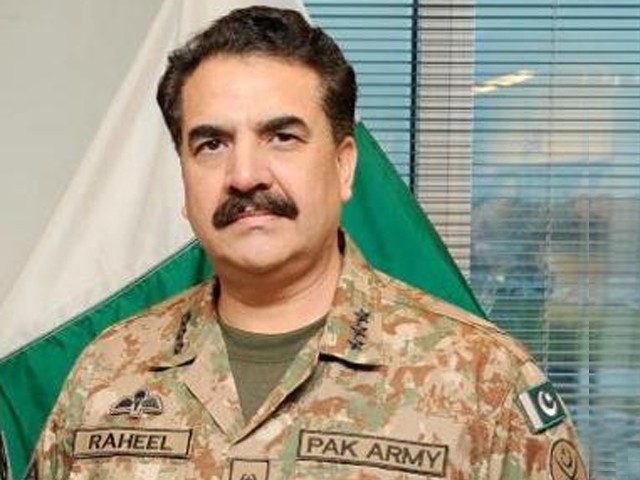
Iftikhar Hussain
While his American hosts were less skeptical about him than his predecessors, Pakistan’s military chief General Raheel Sharif ongoing weeklong visit to the US was rather a mix of bitter and sweet at the same time. But shrouded in secrecy in a crowded media city-Washington DC.
A Washington Post report published ahead of General Raheel’s visit last week said that Pakistan top general will face less skepticism than his predecessors because of the boost in confidence of his allies following Pakistan military offensive in North Waziristan killing more than 1200 militants and sacrificing some 100 soldiers. The much awaited operation in North Waziristan added a strong chip to Pakistan’s bargaining position.
Things probably did not go that smooth. When General Raheel was setting across the table at Pentagon discussing what Pakistan can deliver on and convincing Americans of his military commitment in Afghanistan post-withdrawal period, the critical US concerns were rather echoed by Pakistan top diplomat Sartaj Aziz in his comments to the media.
Sartaj Aziz in an interview said Pakistan should not target militant groups who do not pose a threat to Pakistan’s security. He was apparently referring to the lethal Haqqani network-the prime killer of US troops in Afghanistan. The comments prompted the US state department officials to remind the visiting Pakistani general in town, “Haqqani network poses as much threat to the US as other militant groups.”
It was seen in Washington a kind of reinforcement of the Pentagon report released earlier this month warning Congress that Pakistan army is using proxies in Afghanistan to retain its influence.
Former US Ambassador to Pakistan, William B. Milam, told VOA Deewa that relations between the two important partners seem to have improved over the past year but obviously not perfect. Mr Milam thinks differences over Pakistan’s future role in Afghanistan will decide the course of action.
“Pakistanis claim to have started unravel those ties, (links with Afghan Taliban), but those ties continue to be there and we will see how strong they are as the year goes on and particularly the fighting gets going again probably in the next spring and summer because it gets a pause in the winter anyway”. He appreciated Sartaj Aziz as a good diplomat and hoped that Sartaj Aziz statement at this point would not be harmful.
Experts both in the region and in Washington believe that Pakistan’s powerful but politically ambitious army and the US relationship is based on give and take. And the bargains have been fruitful for Pakistan military in terms of US dollars and military hardware, they argue.
A retired Pakistani brigadier Saad Muhammad Khan says that Pakistan military has a long relationship with the United States. He suggested Pakistan military valued the significance of ties with the United States and would not simply walk away from it for its reliance on the US military hardware and war weaponry.
“There are periodical hiccups but both the militaries will continue to have relations in the future,” the brigadier said. He added that the US military hardware to Pakistan ranges from small guns to F-16 fighter jets and IED-proof military vehicles recently handed over to Pakistan.
Media reports say that Raheel Sharif has informed Americans that Pakistan’s operation against terrorists in the country’s tribal region was affected by Indian troops’ continuous violation of ceasefire at the Line of Control (LoC) and Working Boundary (WB) on the eastern border. Gen Raheel told US officials that Pakistan has deployed 140,000 troops on its Western borders after getting assurance that there would be peace with India on its Eastern borders which did not happen.
A Washington-based expert and author on Pakistan Daniel Markey told the Pentagon-run Military Times another concern for Pakistan is its deteriorating relationship with India. Both countries have been exchanging artillery fire recently, leaving dozens of civilians dead amid the sharpest rise in violence since the early 2000s.
Pakistan former diplomat Jahangir Ashraf Qazi in his piece published in Pakistan leading newspaper, Daily Dawn on November 19, cautioned Islamabad, “Pakistan’s Afghan policy should not be India-centric as that will alienate Afghan public opinion”. The retired diplomat argued that Kabul adamantly wants Pakistan to make a clear choice between supporting the new Afghan government of unity and pursuing its alleged support for the the Afghan Taliban and proxies who seek forcible overthrow of the new elected government in Kabul.
Ambassador Feldman: Pashtuns Have Suffered Disproportionately From Terrorism
US Special Representative for Afghanistan and Pakistan has said that Pashtuns in Pakistan’s tribal regions have suffered from a lack of education, rule of law and an absence of other basic services like roads and economic opportunities. He said Washington’s assistance to Pakistan will help develop the tribal region.
Ambassador Feldman spoke in an exclusive interview with VOA Deewa at the State Department on a range of issues, including US-Pakistan ties, Afghanistan and the withdrawal of U.S.-led international combat forces from Afghanistan at the year’s end. Feldman also discussed Afghanistan-Pakistan relations and Afghanistan’s recent overtures to China.
An edited question-answer version of Ambassador Feldeman’s interview is here:
Question: You mentioned the multi-sectorial U.S. assistance to Pakistan to help the conflict region, Pakistan’s tribal areas, that don’t have access to opportunities and resources….
Feldman: There are a lot of needs in Pakistan and those on the border area, (they) have suffered disproportionally by not having rule of law having applied to all of the country so the need for services, education, energy and economic opportunities, roads, why this work we’ve done is so important, spent close to five billion dollars in Pakistan, even during a time when the U.S. –Pakistan bilateral relationship wasn’t as strong as it is now, that’s why this relationship is important and hopefully these roads will help to provide greater stability and access to economic markets and continue to bring this relationship between Afghanistan and Pakistan and other regions closer together for a prospect of stability.
Question: Pakistani military has launched an operation against militants in that region. How does the U.S. see this operation?
Feldman: We really commend the operation and (it has) been very significant in countering terrorism and just want to ensure that all extremists are equally targeted. What we need to make sure is that they don’t have the ability to reconstitute in Pakistan or in Afghanistan and cause a continued threat to American lives and our partners Afghan lives and for Pakistani lives. Pakistanis have suffered so much at the hands of extremism over the last few years, 55,000 Pakistani deaths and it’s unconscionable and make sure we work together to address this common threat.
Question: What assurances did you get from Pakistani officials to leave a stable Afghanistan?
Feldman: One of the most important things at this point is the remarkable opportunity that there is in the region right now with the new Afghanistan government. I was in Pakistan and in Afghanistan over the last few months as part of the resolution of the electoral impasse there, just saw the President in Beijing too remarkable opportunity for Afghanistan and Pakistan to turn a new page in their relationship, seen this with Pakistan…with…President (Ashraf) Ghani coming to Pakistan in the next few days, seems to be tremendous desire on both parts to ensure that this relationship is put on firmer footing and contributes to greater stability in the region, best indicator that there can be future stability of course U.S. will remain engaged, will have about 10,000 troops as part of a broader NATO troop effort over the next few years, continue to work with countries in the region and so important for China to host this conference to ensure the region stays as stable as possible that’s our end goal interest.
Question: How much the distrust between Afghanistan and Pakistan a challenge to U.S. efforts to leave a peaceful Afghanistan?
Feldman: Of course there is a long history here and we are all honest about that but in the five and a half years I’ve been involved in this job, deputy to my predecessor, we’ve cared deeply about this relationship for many years, exactly this window of opportunity, this is the most alignment I’ve seen in terms of opportunity to start this new chapter in the relationship with so many areas of potential progress here on cross-border military issues, economic and trade issues, regional connectivity issues like electricity, many many things that could be great dividends for the people of Afghanistan and Pakistan and we see every indication that that is possible given the commitment by both Afghanistan and Pakistani leadership.
Question: A recent Pentagon to the Congress says that Pakistan is using proxies, this is not the first time an official report is saying this, Pakistan is using proxies to retain influence and conquer. How do you characterize this at this particular in time?
Feldman: This was a DOD (Department of Defense) report. I’ll have to let them talk about it. We’ve always been honest about the fact that the U.S. and Pakistan have a common enemy in extremism and a common fight, make sure there are no safe heavens on either side of the border. Pakistani people are the ones most impacted by extremism and so greatly value the contributions that have been made in terms of lives and resources dedicated here, common nexus of extremism and all acknowledge more has to be done and continue to work with Pakistan to help eradicate extremist threats.
Question: Your comments on Pakistan army chief General Raheel Sharif’s visit to the United States and its significance.
Feldman: We are greatly looking forward to Gen. Sharif’s visit. I met (have) with him several weeks ago and had a good conversation. (I) know his commitment to protecting Pakistani lives (and making) sure that Pakistani government has control over all of Pakistan. (We) look forward to having close and honest consultations with him when he’s here. He’ll see our senior leaders throughout civilian establishments and then on the think thank people who are important in policy making (he will get a) warm reception in Washington, a token of how important we believe the U.S.-Pakistan bi-lateral relationship is, strong relationship with civilian government and also want to have a strong relationship with Pakistani military.
Question: Afghan President Ashraf Ghani was recently in China and seeking Chinese support for peace and stability in Afghanistan and China was seeking support in return against East Turkistan Islamic Movement. How do you see the two countries’ expectation from each other? And what does the U.S. expect from China to play in a positive role in Afghanistan?
Feldman: Delighted that China has been engaged in the region, (a) longtime partner and ally of Pakistan and glad Chinese are working with Afghanistan and happy this has come into fruition. Yesterday President Obama and Xi identified this as a common interest for China, along its border to counter extremist threats and welcome role they play on economic investment, counter terrorism reconciliation talks and a range of issue China would be helpful on ongoing U.S.-Pakistan relationship? We believe we are on a firmer footing than we have been in many years and continue to facilitate and nurture that maintain that this is a strong and beneficial relationship that delivers for Pakistan and Afghani people happy we’ve been able to deliver on our commitment of assistance over the last few years certainly after the floods in the border regions humanitarian relief way we’ve prioritized assistance for energy projects exchange programs and Fulbright programs enabling 12,000 Pakistanis to go to universities and schools, building thousands of kilometers of roads many in border region and access roads, helping to incentives economic growth initiative programs range of things we’ve done very collaboratively under the structure of the Strategic Dialogue that Sec. (John) Kerry chairs with advisors, various working groups focused on core interests of Pakistani people meeting on economic, finance, counter terrorism etc and now on science, education, and technology range of things we will continue to do to demonstrate we have a long commitment to Pakistan and other countries involved like China is to everyone’s benefit.
Afghan, Pakistani Leaders Seek to Bury Mistrust As Afghan President Makes Maiden Trip To Pakistan
By Iftikhar Hussain
Pakistan Prime Minister Nawaz Sharif and Afghan President Ashraf Ghani following their lengthy meeting in Islamabad on Saturday, told a joint press conference that both the nations have to forget the past and move forward for a better future. The leaders did not use the word turbulent while mentioning the past, though. The political commitment as usual was high on promises for building peace and bilateral relations as both leaders tried to overcome years of mistrust and hostility and promising to boost security and trade ties.
President Ghani made clear his cooperation agenda was plain and straight. “We have overcome obstacles of 13 years in three days and we will not permit the past to destroy the future.” Prime Minister Sharif called Ghani a “dear brother” and said, “Our security and future prosperity remain interlinked,” he said. “I … reaffirmed Pakistan’s support for the intra-Afghan reconciliation process that the new government is initiating.”
The United States sees the apparent warming up of Pak-Afghan relations under the new Afghan President a welcoming opportunity at this crucial time ahead of the international troops’ withdrawal at the year’s end. The US Special Representative for Afghanistan and Pakistan Daniel Feldman told Deewa in an interview, “Afghan President Ashraf Ghani visit offers a remarkable opportunity to turn a new page in their relations”. He said that it seems President Ghani’s visit shows there seems to be a tremendous desire to ensure that the relationship be put on firm footings.
Experts and diplomats say increased trust and security cooperation is key to tackling the twin insurgencies. Many term the visit a leap forward in improving relations but strongly caution on Pakistan’s powerful military continuing security anxiety and proxies to retain its leverage in Afghanistan to counter rival India. Hussain Shaheed Suharwardy, Professor of International Relation at the University of Peshawar told Deewa, “Pakistan still has concerns of Indian influence in Afghanistan and it makes the relations reset a complicated process”.
Kabul is also increasingly turning to regional powers for support, but it will take more than warm words between Sharif and Ghani to repair damaged ties between their countries. An instance of Kabul’s desire to forge regional alliances can be seen in Ghani’s visit to china. Before arriving in Islamabad, the Afghan leader traveled to Beijing and, among other issues, also discussed the subject of Muslim insurgency in China’s far western region of Xinjianq.
Former diplomat Ayaz Wazir commends the commitment on part of both Ghani and Sharif but he warns similar efforts have fallen short of implementation in the past. He says, “What we need is the practical implementation of all what they desire”.
The two neighbors have accused each other in the past of harboring anti-government Taliban insurgents across their shared border, and bilateral relations were often tempestuous under the previous Afghan president, Hamid Karzai. The Afghan government is pursuing peace talks with the Taliban, who have gained ground as NATO pulls back its troops ahead of a full withdrawal.
Afghan and US officials have frequently accused Pakistani security services of links to Taliban and Haqqani Network insurgents, who carry out deadly attacks in Afghanistan. But Islamabad denies those charges and has recently launched a military crackdown in North Waziristan tribal region, considered to be a stronghold do the Haqqqni network.
In the past two years, Pakistan has begun levelling the same accusation at Afghanistan, accusing it of tolerating bases belonging to Mullah Fazlullah, the nominal leader of the Pakistani Taliban, a group sworn to overthrow the state.

